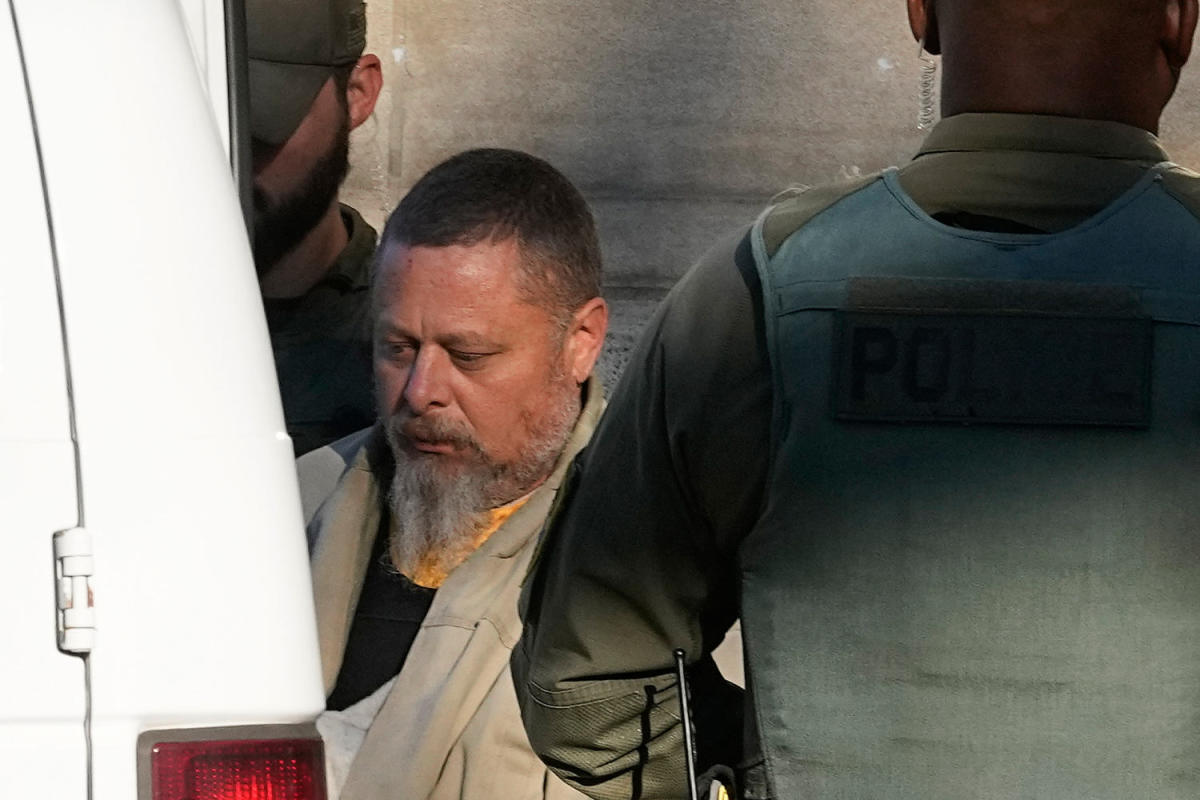
Richard Allen, the Indiana man convicted of killing two middle school girls in 2017, was sentenced to 130 years in prison on Friday, almost eight years after the children’s bodies were found near a hiking trail.
Allen, 52, was convicted of murder in November after a four-week trial in the deaths of Abigail Williams, 13, and Liberty German, 14, in Delphi.
The bodies of the girls, who were close friends, were found near a hiking trail on Feb. 14, 2017, but their killings went unsolved for years.
Advertisement
Advertisement
Allen received the maximum sentence. Judge Frances C. Gull told him it ranks “right up there with the most hideous crimes.”
“These families will deal with your carnage forever,” the judge said.
Mike Patty, Liberty’s grandfather and legal guardian, said that “justice has been served for the girls.”
“It’s been almost 8 years coming. If I live to make it 80, it would almost be 10% of my life has been spent working on this,” he said at a news conference.
Indianapolis State Police arrested Allen in October 2022. He was charged with murder after what the state police superintendent called a “long-term and complex investigation.”
Advertisement
Advertisement
Prosecutors said that Allen encountered the girls on the Monon High Bridge Trail and that, armed with a gun, he forced them down a hill and cut their throats.
A jury convicted Allen on Nov. 11 of four counts of murder: one count each of felony murder and murder for each victim.
Allen had faced a potential sentence of 45 to 130 years in prison.
His attorneys say they plan to appeal. “Richard Allen maintains his innocence,” they wrote in a sentencing memo ahead of Friday’s sentencing.
The killings shook the small town of Delphi, a community of around 2,900 about 60 miles northwest of Indianapolis.
Liberty had recorded a man who prosecutors allege was Allen in cellphone video that day. Prosecutors also said that an unspent .40-caliber round that came from Allen’s gun was found at the scene and that a black 2016 Ford Focus was seen on security video nearby — and that Allen owned the only such car registered in Carroll County when the murders took place.
Advertisement
Advertisement
More in U.S.
Carroll County Prosecutor Nicholas McLeland said the video Liberty recorded was a key piece of evidence in the case.
“I’d be remiss if I didn’t thank Abby and Libby themselves. Libby, for recording the defendant as he walked across the bridge. Having the wherewithal to pull out her phone and record that individual, having the wherewithal to know that something wasn’t right,” he said at the news conference.
“And then to Abby for hiding the phone,” McLeland continued. “Hiding the phone from the killer so they couldn’t take it with him. Hiding the phone so that law enforcement could find it and get that piece of evidence that Libby had collected. Without the efforts from those two little girls, we wouldn’t be here today. So Abby and Libby, thank you.”
Defense attorneys argued no one identified Allen as the man in the video or seen by witnesses. They also argued no forensic or DNA evidence connected him to the killings.
Advertisement
Advertisement
Prosecutors played an alleged confession made last year in a recorded jail call to his wife. In it, he says: “I did it, I killed Abby. I killed Abby and Libby.”
His wife did not appear to believe him and said his medication must be messing with his mind.
A former prison psychologist also testified that Allen confessed to her that he killed the girls, and prosecutors said he confessed to other prison staff members.
Allen’s defense attorney, Brad Rozzi, has attributed the confessions to a mental health crisis. Allen was being held in a maximum-security prison while he awaited trial. Defense attorneys have also argued he was kept in solitary confinement without due process.
Advertisement
Advertisement
Defense attorneys also wrote in a sentencing memorandum that Allen has a long history of mental health illness and that he had been treated for major depressive disorder and anxiety disorder throughout his life.
Allen, who was a CVS clerk at the time of the killings, was not a suspect until a file clerk organizing thousands of tips discovered a mislabeled “lead sheet” in September 2022.
The document, which had incorrectly been marked “clear,” showed that Allen reached out to investigators days after the killings and said he had been at the same location as the girls on the day they disappeared.
Defense attorneys have said that Allen often walked on that trail and that he voluntarily went to police because he wanted to help in any way he could.
This article was originally published on NBCNews.com
EMEA Tribune is not involved in this news article, it is taken from our partners and or from the News Agencies. Copyright and Credit go to the News Agencies, email news@emeatribune.com Follow our WhatsApp verified Channel





